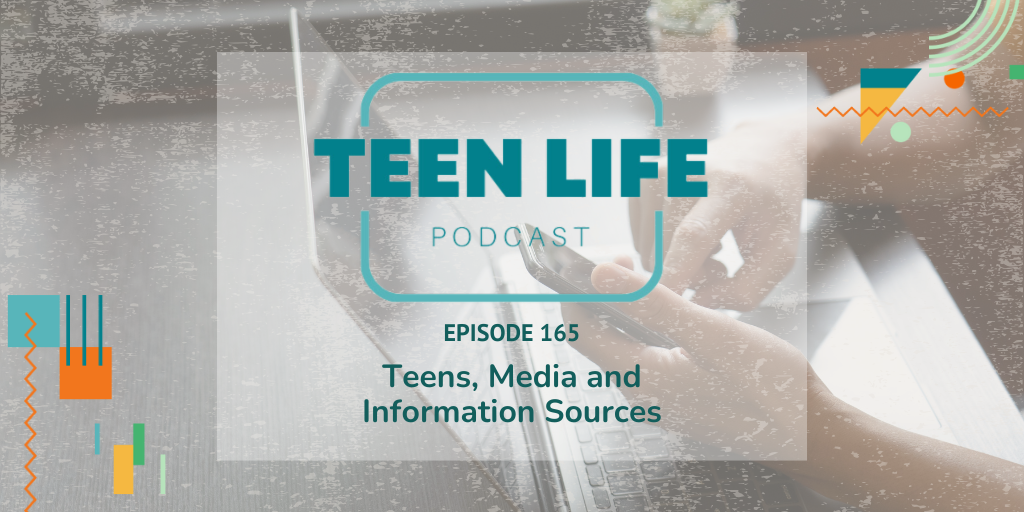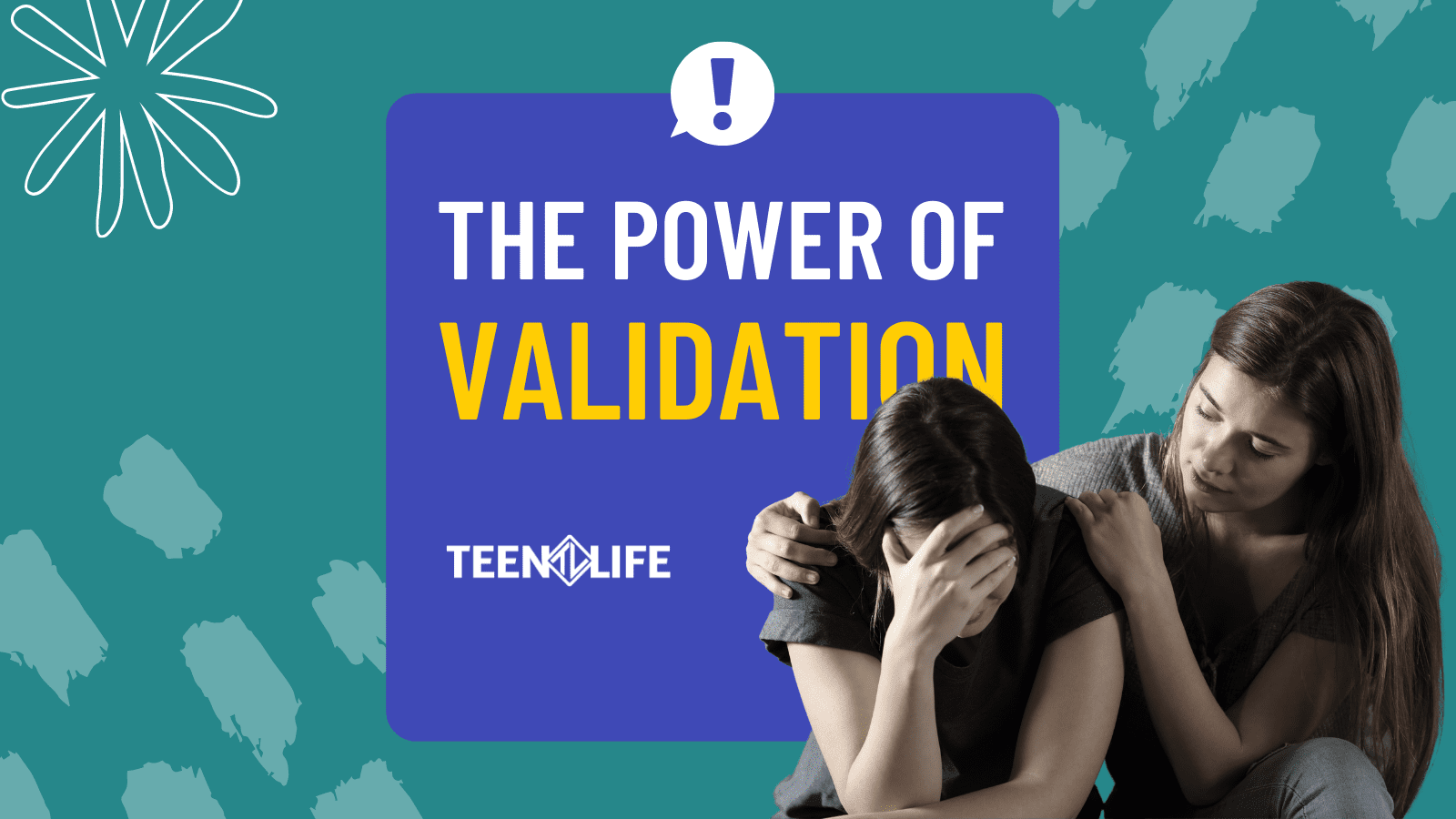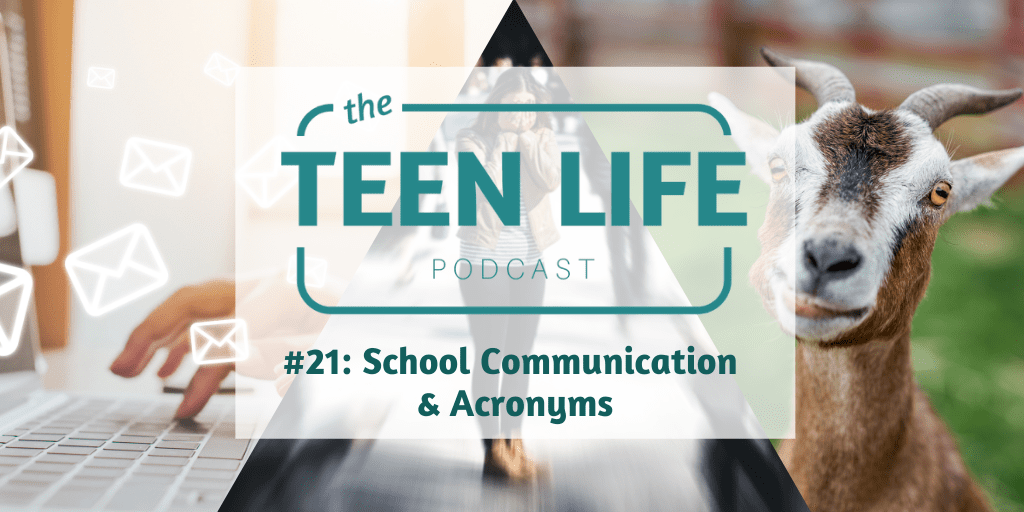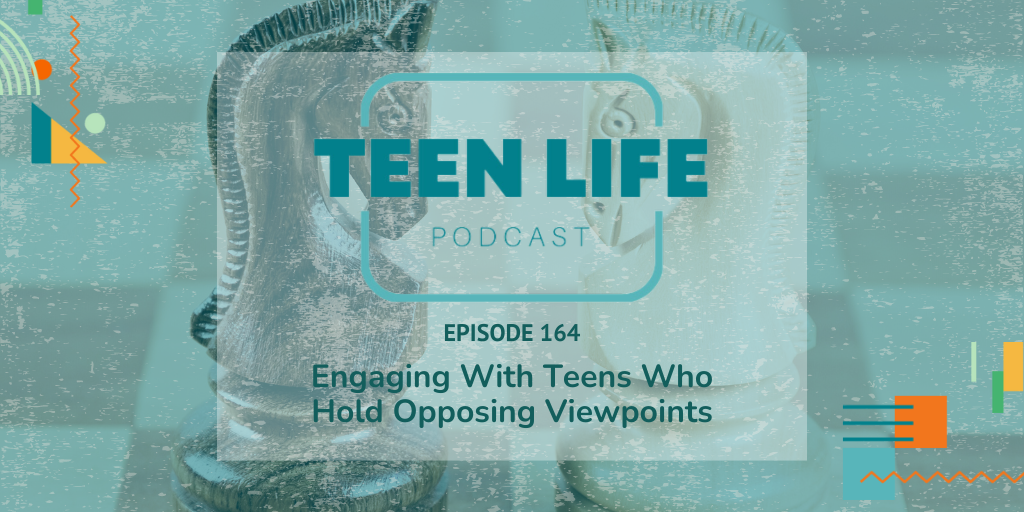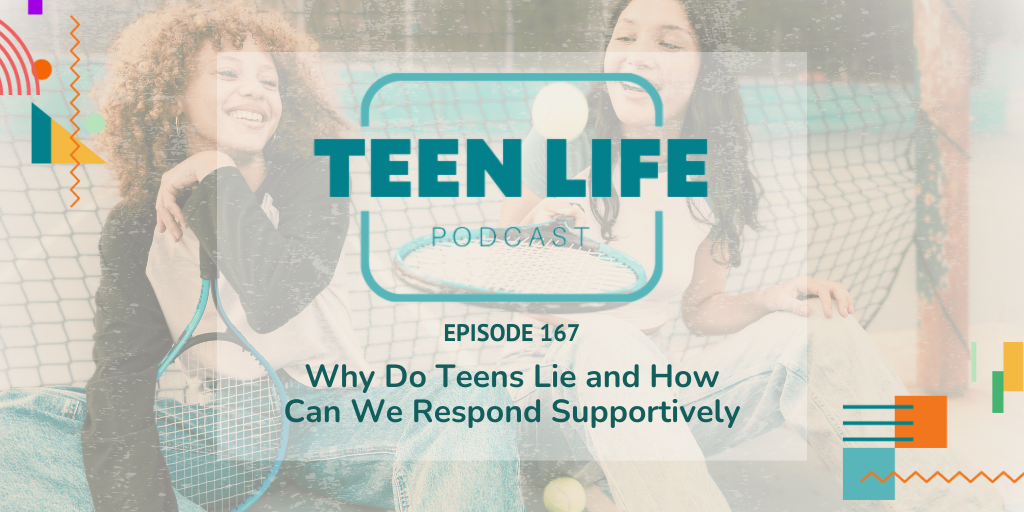
Why Do Teens Lie and How Can We Respond Supportively | Ep. 167
Podcast: Play in new window | Download
What to Do When You Think a Teen is Lying
Key Question
What can I do when I think a teen is lying to me?
Understanding Why Teens Lie
Before jumping to conclusions, let’s explore some reasons why teens may not be completely honest. Lying can be a way for them to navigate complex feelings and situations they may not fully understand.
Some of the top reasons teens might lie:
- Fear of Consequences: They’re worried about getting in trouble.
- Feeling Overwhelmed: Sometimes the truth feels too hard to face.
- Testing Boundaries: Pushing limits can be a normal (if challenging) part of growing up.
- Peer Pressure: The influence of friends can drive risky choices, and lying may feel like the only option.
- Low Self-Esteem: When self-worth is low, telling the truth can feel risky.
- Protection: They might be covering for themselves or others to avoid negative outcomes.
Understanding these motivations helps us approach situations of dishonesty with empathy, reducing tension and focusing on the root causes of their behavior.
Responding Calmly and Constructively
So, what can we do when we suspect a teen might not be telling the truth? Here are some proven strategies that prioritize both honesty and connection:
Stay Calm and Non-Confrontational
Avoid direct accusations, as they often create defensiveness.
Give Them Space to Explain
Open the door for them to share their perspective.
Address the Root Cause
Use what you know about them to understand why they might be dishonest.
Set Clear Expectations
Remind them why honesty is important and that mistakes are a part of growth.
Focus on the Relationship
Keep communication open, emphasizing that honesty strengthens trust.
Create a Safe Space to Come Clean
Say, “If you made a mistake or feel like you didn’t tell me the whole truth, I’d like to hear about it so we can work through it together.”
Encourage Problem-Solving
Talk through how they might handle things differently next time.
Perspective Shift
When we see that lying often reflects deeper struggles, it can help us approach these moments with more patience and understanding. Rather than simply reacting to the lie itself, we can look for ways to address the underlying reasons.
TL Tips & Takeaways:
Use non-confrontational phrases like:
- “I’m hearing some things that don’t add up…can you help me understand?”
- “I don’t remember it happening that way; can you give me your side of the story?”
Address it when emotions are calm, making it easier to have an honest conversation.
Say, “I want you to be able to trust me, even if you are scared to get in trouble. What do you need from me to feel safe to tell the truth?”
Remember, you’re helping build honesty, trust, and resilience in teens just by listening and learning.
Read Episode Transcript
What can I do when a teen is lying to me? And this is a, this is a question, right? That like is important to me because, little known fact about me, Caleb, and I’m here by the way, with Tobin and Karlie. Hey guys. Little known fact about me is I had a nickname growing up. was CL and it took me forever like to even understood what it mean, what it meant. Cause every time I asked, like even in like middle school, elementary, was like, what does CL mean? Like it means compulsive liar was my nickname was. And I was like, I didn’t know what compulsive meant to like probably way later in life. And I was like, they, okay. It made sense. So, I lied a lot growing up. And so I think the first question to ask too is why do teens lie?
And right. And so I, there’s a few that we have written down fear of consequences, feeling overwhelmed, testing boundaries, peer pressure, low self-esteem, protecting themselves or others. And then.
Karlie Duke (01:04)
Sure, that’s good place to start.
And then also like Caleb said, do know we have some friends who don’t even really think about it. And they’re maybe not even like trying to lie. They just come up with a story.
Caleb Hatchett (01:34)
That’s what I was going to say. Or it’s funny. You think it’s funny. And like, think for me, I don’t know. think it started out as like sarcasm in of itself is like a form of lying that is like culturally acceptable. And like, I think for me, at least it stemmed a lot out of that was like, I would get laughs if I was sarcastic. so then it just, it just took a tailspin into, yeah. Right.
Karlie Duke (02:05)
You embellish, you’re an embellisher. Well, I know in high school, like little thing, there are lots of things to lie about, but one example of if I was ever running late to school, man, in the car the whole way, was like, okay, what happened? Did I hit a train? Was there a car accident? Could my car not start? And for me, it also came from a place of like not wanting to disappoint. I’m a big people pleaser, enneagram two.
Caleb Hatchett (02:20)
Yeah. Yes.
Yeah.
Karlie Duke (02:32)
Any of you know any of Graham’s stuff? So mine was also like, I would rather lie than have them think I just was lazy today.
Caleb Hatchett (02:40)
Yeah, that’s a good one.
Karlie Duke (02:41)
and just didn’t get up in time. And so I think there are lots of reasons that our teens lie. And so trying to think through, it’s still not great and we still need to call them to a higher standard, but there are usually reasons behind it. And sometimes they aren’t just like, I just want to lie because I want to be dishonest.
Caleb Hatchett (02:50)
Mm-hmm.
Yeah, I think this is a, this is a good story. I think for me, like also like to get out of things, it’s just like, kind of like you said, like whether it comes from a place of not wanting to disappoint or even just like laziness. remember there was one time. This is, this is the first time it’s out in public, but, there was, I was like a part of the scholarship at the college that I went to and part of the scholarship was you had to go to this dinner and.
Karlie Duke (03:11)
Hmm.
Caleb Hatchett (03:32)
It’s embarrassing story, okay? But it needs to be out there. It’s, it’s, it’s entertaining. The lady who runs the scholarship comes up to me. It goes, Caleb, the scholarship dinner is this date. Will you be able to make it?
I, no, I’m sorry. Like just knee jerk reaction. Cause I didn’t really want to go. And she goes, why not? And I’m like, then now I’m scrambling. Now I’m in it. It would have just been easier to be like, give me the date though. I can make it. But I say, my friend has a wedding. And she goes on a Tuesday.
Karlie Duke (04:08)
you
Caleb Hatchett (04:12)
So then I have to go and I’m like wait, what was the date again? And she tells me I pull my phone out I’m just buying time and then it gets worse because I go Yeah It’s so embarrassing. Yes, I go he was a friend in high school I was
Karlie Duke (04:27)
You stuck with that story?
Caleb Hatchett (04:34)
Really like one of his only friends in high school. I’m the only person like in his, in his like groom party. And it’s like a shotgun wedding. He got this girl pregnant. And so it’s, it has to be like low key. And so they’re doing it on a Tuesday and she can’t press me on that. She’s like, okay. And so I don’t leave the room that day. And then I will, remember literally walking away from that conversation.
Tobin (04:47)
Hey, love.
That
Caleb Hatchett (05:04)
And I was like, why, like why, why did I do that? Like it just, it just, again, CL compulsively just came out. And so I don’t know. Maybe there are other compulsive liars out there who just can’t help themselves with anything. So.
Tobin (05:23)
I just think it’s interesting that you went from I’m in a wedding to I’m a groomsman for a guy that got his girlfriend pregnant. Like, just…
Karlie Duke (05:28)
you
Caleb Hatchett (05:31)
Yeah, we got there some But anyways, it’s a safe space here, okay? I am
Karlie Duke (05:38)
Caleb. But I do think that’s a great example. Number one, she was the sweetest woman. So you should feel horrible. You should. And so, the kind of going into like, can we do when you’re lying? And she’s probably sitting there going, when you said I’m in a wedding, she’s like, no, you’re not. She knew. But like asking the, instead of just saying like, I think you’re lying for her to be like, really? On a Tuesday? Tell me more about that.
Caleb Hatchett (05:43)
she was. I do. I do.
Yeah, yeah, she pressed me on it.
Karlie Duke (06:08)
And so I think one of the first tips is stay calm and non-confrontational. Like if you just come out the gate at a teenager and like you’re lying, you’re not telling me the truth, they immediately are A, gonna shut down or B, gonna double down on their lie in a way that’s not helpful for anyone, including you, you’re not gonna get what you want out of that. And then like giving them space to explain if you ask a question.
Caleb Hatchett (06:18)
Mm.
Yeah.
Karlie Duke (06:35)
and just kind of see what happens. Now you might have a liar like Caleb who just keeps going because she gave you an opportunity even with giving you the date again to be like, man, I got the date wrong. I can make that.
Caleb Hatchett (06:43)
I know.
Yeah, absolutely right Absolutely, right. She like if again we’re breaking this down as ways for adults to handle this. Yeah absolutely because I mean I Don’t know. I’m a nice enough kid that I don’t if she was like I think you’re lying. I might have just been like yeah, but If there are like right like then at a certain point like if you’re just gonna call him out flat out
Karlie Duke (07:08)
You
Caleb Hatchett (07:15)
then it’s a testament of wills. Like you can’t prove each other right or wrong. And so it’s like, no, I’m not. Yes, you are. And then it’s like, I’m in middle school again. So yeah, I think staying, staying calm and like Karlie said, yeah, even just asking other questions, making them explain it. And again, like even as, we’re thinking about as, as adults or leading groups, things like that is, is setting clear expectations of we’re gonna
We’re going to be honest here and set those norms.
Karlie Duke (07:50)
What I think what you said is really important to you, Caleb, rarely can you like outright prove that they’re lying. Like a lot of times, even if you really have a lot of evidence and you really think they’re not telling the truth, if they just like look at you dead in the eyes and are like, no, this is what happened. It’s really hard to be like, no, no, you’re wrong. And so you do have to balance that really well.
Going back to what we talked to at the beginning, like we also have to get to why are they lying?
What is the root cause here? And maybe try to like talk through some of that of like, hey, if you think you’re gonna get in trouble for that, like, let’s have a real conversation, I want you to be honest with me. And as of right now, like, that doesn’t work always, but like, you’re not gonna get in trouble. I’d rather just know what’s going on, then try to catch you lying. So like, let’s actually talk about this right now.
Caleb Hatchett (08:23)
Yeah.
Mm-hmm.
Karlie Duke (08:46)
Or if you think it’s peer pressure of, you might be getting pressure from friends and you’re trying to cover for them. And if that’s the case, let’s talk about that and how that’s actually not even helpful for them because I want to help them and I need to know what’s happening. Because sometimes, like we said, teenagers lie for each other because they’re scared to get a friend in trouble or a friend told them you can’t tell anyone or…
Don’t get me in trouble. You know that they’re cheating off of you, but you can’t say anything because then it causes problems. And so trying to figure out what could be holding them back from telling the truth. And let’s address that first before we address the actual lie.
Caleb Hatchett (09:29)
Yeah.
Tobin (09:30)
Sometimes the lies are more just embellishments too. like if a, I, what I come across more than anything is it’s not really out and out lying. It’s more embellishing what’s actually happened. Like, like, did you, know, how did you do on your, on your, you know, test today? Like, I think I like aced it and it was really great. And my teacher gave me.
Caleb Hatchett (09:34)
Mm-hmm.
Tobin (09:54)
You know, through confetti, but when I turned it in, cause I did so good, you know, like, like, mean, that’s like, obviously, you know, over exaggeration, but like, sometimes people will embellish because to either make a story better or to, save a little face of what might be going on. And, and sometimes like, I think it’s really, really as a, as humans were really quick to jump to, you’re a liar and you’re, and you’re this, this admonishing situation. Like my, my five-year-old is like that. Like if we, like we went.
somewhere last night and we didn’t end up getting him something that we told him. was like, a, like a snack. told him I get them because we, just forgot and we got to the car and he just like, he went straight to a, you’re a liar. Like, and just like went straight to that. And it’s just like, but that’s how, but that’s how we are as humans is we go straight to hurt and angry and you’ve, you’ve wronged me instead of, well either the lie wasn’t as bad as I, as I want, as I think it is, or like, like, like you said,
Karlie Duke (10:37)
Ha ha.
Tobin (10:54)
what’s behind it and what can we do to help with that and move past it and stay non-confrontational.
Caleb Hatchett (10:59)
So then like, what do we do, right? As adults, parents, leaders in a student’s life, if we do catch them, right? In a lie. And I think too, like it goes back to like paying attention, asking those questions, you know, if you’re involved and invested in a teen’s life, you know, it’s small things that you can pick up on. I remember one time.
I told my parents that we were just talking about what me and my friends did. And I said, we all went to Sonic. I was the only one who could drive and I had three friends over and they go, how did you all get to Sonic? And I’m like, cause I shouldn’t have been driving more than one person in the car. Cause I had only had my license for a few months. Right. But, but I like, the question is like, what, do we do as adults leaders when we do catch someone in a lie?
Karlie Duke (11:45)
Well, and I think one of the things that we talk about in our teen life facilitator training a lot is be curious. And so in this situation, often there are red flags, like when they’re talking about going to Sonic and you as a parent are thinking, well, they shouldn’t have done that and how else would they have gotten there? I know the facts. So asking questions of like, well, how did you get there? What did that look like?
Caleb Hatchett (12:10)
Yeah.
Karlie Duke (12:11)
for if you’re at school and they’re talking about something that happened or why they didn’t do homework and you’re sitting there going, man, they’re like really emotional about this or they are like really drilling down. Like I just asked a simple question and they are going into a lot more detail. That’s probably a red flag that like, maybe there’s something going on that you can start to ask questions about because you’re right, Tobin, just saying like, you’re a liar. Does not focus on the relationship and keep that relationship.
Caleb Hatchett (12:26)
Yeah.
Tobin (12:39)
Yeah.
Karlie Duke (12:40)
because I think in some ways you have to set an environment where they feel safe to share even if they’ve already lied.
Tobin (12:48)
And if you, you uncover that they are not telling you the full truth as a teacher or a parent or an adult mentor, whatever it may be, maybe get to the place where you can ask the question, why did you feel the need to do that? And like, don’t ask it in like a, you know, mom guilt, dad guilt kind of thing. Like, why did you feel any, because they might have an answer for you that maybe you need to hear too. Like maybe it needs like, Hey, when I tell you, like, like I know that I’ve had this issue with my son before of
Caleb Hatchett (13:06)
Yeah.
Tobin (13:17)
when he’ll say something to me, I, I am in the past and still some now, but like, I’ve gotten better about it, but like, would immediately go to my anger mode or like my frustrated mode. so that made him not want to come tell me because he knew that the reaction was going to be quick and not pleasant. And so that was something that like we had talked and he had said, like, whenever I talked to you, like you immediately go to this. And so,
Maybe it’s a thing where y’all get better together and you figure out like, what, what do you need to hear that is going to make the situation better? And what, what am I doing? Like, why did you feel the need to hide the truth from me? And some of it too, like it might be, give you a chance to give them a, like an opening to say something that they need to be talked through. Like, like, like something from their past, something from other adults that they struggle with and stuff like that. So, I mean, I just think that there’s.
There’s easy ways to make this work for you long-term and the whole point of this stuff is not to get crack on people for not telling lies, it’s to figure out what’s the root of it and how do we stop that from happening again kind of thing.
Caleb Hatchett (14:30)
Yeah, I think like creating a safe space and giving like a rational response is almost key in those moments, right? Because if you explode, you make it into this big thing, then like they’re going to get then in their mind is, okay, I’m going to have to get better at lying. Like I’m going to have to do everything in my power again to not get caught.
Karlie Duke (14:48)
Right.
Caleb Hatchett (14:52)
Right? If this is how the reaction is going to be. so creating a space where it’s a, we’re having a conversation and this is safe. And I want to know what you did. I’m not a happy that she, that she will lie. And I’m actually more upset about the fact that you lied than what you did, but this should help in going forward, knowing like, man, like this is a safe space and, I want to help you walk through whether it is you’re afraid of, of the consequences or things like that of.
of how can we help create this environment and this space where you’re comfortable with coming to me in the first place, I think is important. Because yeah, mean, personal experience and just knowing how teams work, it’s a, no, I got caught and there’s a consequence, which again, there should be, right? But if there’s the consequence without an explanation or without using it as an opportunity to help create a safe space, then it’s.
Now I have to do everything I can not to get caught again.
Tobin (15:50)
Well, can I, can I, I’m going to tap in on that consequence thing real quick. Cause, you’re right. There should be a consequence, but also if your consequence is so, so strict and bad and it doesn’t mean, I had parents that were when you did something like it was almost like there was a, like a theoretical chart of when you do this, this is what happens. And, and like, I think sometimes we get into that, that mode of in schools are like this of.
Tobin (16:18)
When you, when you get in trouble, this is the consequence. with sometimes there’s, there’s grace in the, you don’t have to, like, if they, if they catch, if you catch them in a certain lie or problem, you don’t have to do the generic. This is what I do for a lie every time. Because again, if, especially if you get them to open up with you, that gives you a chance to show them that they can trust you.
And yeah, there still needs to be a consequence and the consequence can be major, but it doesn’t have to be this immediate, okay, thank you for telling me the truth, and thank you for working with me. But then also I’m going to slam the book down on you at the same time. so, and again, there are times that you need to do that and you need to drop the hammer on the consequences, but just kind of be mindful about that too, of there doesn’t have to be a set list of here’s how we handle these situations. Everything should be taken case-by-case.
Karlie said this a lot, you know,
Caleb Hatchett (16:55)
Absolutely. Yeah.
Absolutely right.
Tobin (17:18)
She said to stay curious with one thing we say a lot too is be shockproof because, that goes with this stuff too, is that you have to know that this stuff’s going to happen. And if you behave that you are shocked or outraged or angry, then that’s going to put a wall between you and the teenager.
Caleb Hatchett (17:22)
Mm-hmm.
Karlie Duke (17:34)
When I think for school people especially, one of the things that we do in teen life groups is I will sit down at the very beginning of my group and say, hey, this is a safe place. What you say in here stays in here. We always clarify that with unless you were talking about hurting yourself or someone else. And then I do have to report that.
But otherwise, if you need to talk about something that happened at home that you’re upset about, I’m not gonna go call your mom.
Caleb Hatchett (18:03)
Hmm.
Karlie Duke (18:04)
And so also knowing, like I said, you know your situation and what you can and can’t say, but if it’s something that they feel like they need to share and it’s not, they’re worried about getting in trouble or they’re worried about what you’re going to think, just be like, Hey, this is a safe place. And like, I’m a trusted person for you so you can share this. and then also like you’re saying Tobin, knowing when to say, you know what grace is more important here in this situation than the consequence. And sometimes it might be, there’s a natural consequence that comes with that. They don’t turn.
their homework in so like hey and they lied about it and so instead of getting them in double trouble just be like hey there are natural consequences for not turning your homework in but like I just want to talk through this and you’re not gonna get in trouble for lying if we can have a good conversation right now I’ve had to do that with my seven-year-old if sometimes he sneaks and hides things and I’ve had to be like or something was colored on the wall whoever will confess to this
you’re gonna clean it up, but you’re gonna get in less trouble if you tell the truth now than if you continue to lie to me about it. And so also having that conversation.
Caleb Hatchett (19:06)
Yeah.
And I think too, like helping teens understand even in a lot of ways, like of where you’re coming from, right? Cause at the end of the day, like why, why we get so upset about being lied to is it’s, it’s the now a lack of trust, right? Like, I don’t know how much I can trust you in certain things if I can’t trust what you say. And so, you know, even helping them understand, like it’s
You know, I’m not, might not, you might not be grounded. It might not be this huge thing, but like in a way this relationship has shifted a bit, right? Because if you think about your best friends and if they lied to you, you’re going to be a little hurt. so like me as a trusted adult, as a parent trust has been
lost or given, right? And so it’s how can we have a relationship that we trust each other? And so even helping them understanding where you’re coming from in the midst of all of this can hopefully help them kind of understand of why that reaction is there for you.
Karlie Duke (20:10)
Okay, yeah, good. Okay, so I think some just takeaways as you leave the podcast episode today, maybe adopt some non-confrontational phrases, things like, hey, I’m hearing some things that don’t add up. Can you help me understand? That would have been a great thing to say to Caleb in the wedding situation. Or.
Caleb Hatchett (20:27)
Yeah. Yeah. It would have.
Karlie Duke (20:30)
If you hear them telling a story that you were there for and you’re like, they’re lying, that’s not what happened. Maybe instead of saying, hey, that’s not what happened. Like, I don’t remember it happening that way. Will you give me your side of the story? And having an opening a conversation where like, we saw that differently. Or if they’re saying you said this to me and I can’t believe that. And you’re like, they’re lying. I never said that.
Caleb Hatchett (20:43)
Yeah.
Karlie Duke (20:52)
having like, I don’t remember it that way. So why don’t you tell me your side of the story and then I’ll share what I think happened. And maybe we can come to a middle place there. I think sometimes it’s also important to address it when emotions aren’t as high. So if you don’t have to address it in the moment, come back and maybe even have a conversation of like, okay, let’s talk about what happened there. What can we do differently next time? Or what do you need from me?
so that you can be honest moving forward because I wanna make sure that we’re trustworthy. I know we’ve talked a lot about that of like making sure that you’re a safe place too. And so maybe when we aren’t as upset both sides, you can have that conversation of like, seems like you’re kind of scared to tell me the truth. So what do we need to change or what can I do to make you feel safe in this situation?
Well, that’s a wrap on this question and this episode. So subscribe on YouTube or wherever you listen to podcasts to get our next episodes and questions coming up. And as always, we want to know your questions. So you can email podcast at teenlife.ngo if you want to submit a question for the podcast to cover. And with that, we’ll see you next week.
Links & Resources:
- Teen Life Podcast: Lying
- Teen Life Blog: Challenging Teen Stereotypes | What Are Family Values and Why Do They Matter?

Karlie Duke
Communications Director

Tobin Hodges
Program Director

Caleb Hatchett
Podcast Host
Karlie Duke | Director of Communications
Karlie has always had a heart for teenagers. Through her role at Teen Life, she loves to showcase the amazing stories coming out of Support Groups, but she is especially passionate about helping adults and teenagers find connection. Karlie has a BS in Communications with a minor in Family Studies from Abilene Christian University.
Caleb Hatchett | Podcast Co-Host
Caleb loves helping teenagers take ownership of their faith and relationships. He graduated from Abilene Christian University with a degree in Youth and Family Ministry and is currently Student Ministry Director at Jenks Church in Oklahoma.
Tobin Hodges | Program Director
Tobin’s entire career has been centered around students and teens from all walks of life. He has a passion for helping teens be their best selves. As Program Director, he loves working directly with school staff and students through Teen Life Support Groups. Tobin has a Bachelor’s Degree in Music from Texas Tech University.


